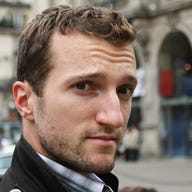Paris and San Francisco renew vows in digital partnership

PARIS –- San Francisco and Paris have renewed their vows as digital sister cities as their mayors signed a new agreement dedicated to developing smarter cities. Paris's mayor Bertrand Delanoë welcomed Californian mayor Ed Lee at City Hall in March to discuss the updates to the existing partnership linking the two innovative cities.
The new convention signed this March reaffirms the cities' partnership with San Francisco's current mayor, Lee, who managed a few words in French during his visits to incubators and labs with the French mayor. The convention emphasizes the development of "smarter cities" and a shared digital economy. Over the past few years, Paris has supported many initiatives to rethink and reshape urban services, like eco-friendly climate control in buildings, the public biking Vélib' service, and the newer car share program, Autolib'. The new agreement looks to expand such endeavors in both cities -- as evidenced by San Francisco's own bike share program rolling out this summer.
The original sister city partnership began in 1996, evolving with San Francisco's new digital sister cities initiative in 2006. This effort saw pacts signed with cities worldwide including Toronto and Bangalore, though programs from Canada to Ireland to New Zealand are now dormant, according to Mark Chandler, director of international trade at San Francisco's City Hall. While those responsible for the initial program have moved on, the Paris link continues to thrive.
Paris mayor Bertrand Delanoë joined the digital sister city endeavor with mayor Gavin Newsom of San Francisco, a city that many call the most European of U.S. cities. The idea was to bring the best of Silicon Valley, including giants like HP, Google and IBM together with Paris's digital small and medium enterprises group, Cap Digital, with support from French media and telecommunications players like telecommunications provider SFR, Nokia France, and the digital publishing giant Fondation Lagardère.
They shared research and launched programs together like the "digital pathway program" that brought new media to disadvantaged neighborhoods. Labs in both countries also collaborated on the Sebastianprogram, a new way for creative professionals to collaborate remotely in real-time. Since 2011, the French consulate in San Francisco has also hosted the annual California France Forum on Energy Efficiency Technologies, bringing together over 100 industry players from both countries to address various opportunities surrounding Big Data.
Jean-Louis Missika, deputy mayor in charge of innovation, helped facilitate the revised partnership. He said that the new protocol further and more clearly defined the scientific cooperation of the two partners in the development of smart cities. A main point discussed was a partnership between the University of California's CITRIS lab and Paris's INRIA, a public consortium of startups and researchers.
Over the next few years, both cities will look to share services and research from the labs, including sending startup teams overseas to tap into resources available in the partner city. Five French startups will be chosen to spend a month in the City by the Bay for a month -- at no cost -- thanks to an agreement with the HubTech21 conference. Researchers from both cities can attend other digital festivals and conferences this year like Tech Crunch in California and Futur en Seine in Paris.
In Paris, Californian startups can join the likes of Google who established a major European headquarters in the City of Light, exploring new geographic playing fields without investing too much. "Often enterprises want to feel out a market and to test it and not have a long-term engagement," Missika said, explaining that the city will work to offer these entrepreneurs the chance to work for short periods of time, such as weeks or months, in France.
The Paris Region Lab, a city-sponsored initiative to test new innovations across town, is just one of many examples of how the city has publicly funded business incubators to help fledgling entrepreneurs. Missika said that Paris is an excellent place for digital enterprises from California to implant themselves, especially in one the many state-funded incubators, as opposed to the mainly private counterparts in California. "We are going to make room for Californian startups who are interested in Parisian incubators," he said.
More interestingly for Parisian startups, Silicon Valley is a hub of capital and investors unparalleled to any such funding in France. "One last element we discussed was inviting Parisian enterprises to meet capital risk takers in California," he said, emphasizing the lack of such possibility on the European front.
Both cities will benefit from experimentation and sharing of municipal projects. For example, the French introduced Lee to the car sharing program Autolib'. "He thought the Autolib' was astounding. It's something they could potentially introduce in San Francisco," Missika said.
The pact will continue over the next few years, with researchers in both cities reacting positively to the partnership according to questionnaires, Missika said. "We are in an exploratory phases at the moment. There are concrete topics being researched that could lead to joint experimentation soon," he said, though it may be some time before the Autolib’s Californian twin is rolling through the Castro.
Photos: Miguel Vaca (top) / Sophie Robichon (below, both mayors during a presentation of the Autolib' in Paris, Lee second from Left, Delanoë second from right)
This post was originally published on Smartplanet.com

